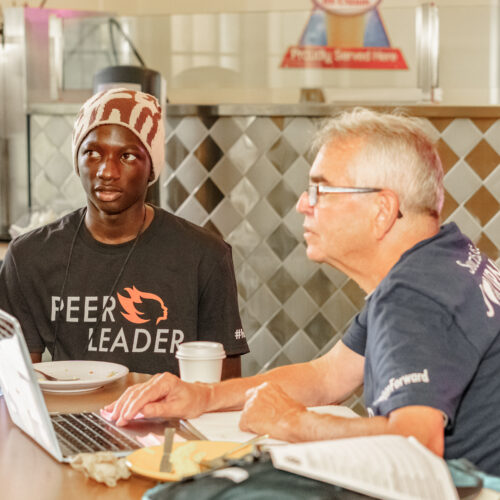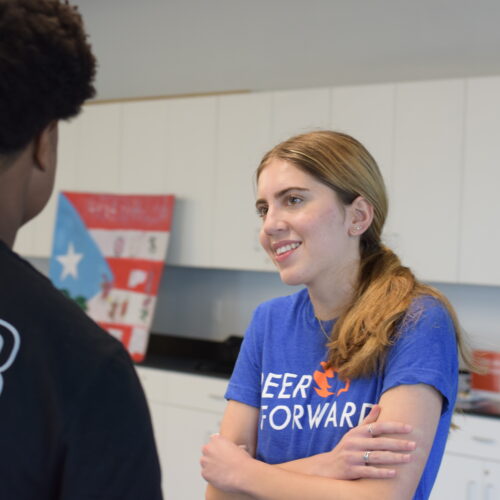PeerForward highlights the college and career pathways of a different alum of our unique Peer Leader program.
When did you become a part of PeerForward? Please share about your summer workshop experience?
I started being engaged with PeerForward the summer before my senior year. I went to the workshop hosted at the University of Missouri-St. Louis. It was my very first time staying on a college campus, but also my first time being away from my mom for that long of a time. I remember being very nervous about going to the workshop and hoped to see friends from my school. However, I ended up being the only one from my high school at that session. Though, it wasn’t a hindrance. The one thing I remember from everyone was the optimism. I learned that though transitioning from high school to college can be a big shock, if you stay optimistic and continue to persevere, you will adapt.
How did PeerForward help you to prepare for college? How has PeerForward influenced your college experience?
PeerForward is the entire reason I attend the University of Pennsylvania. PeerForward made me realize that I had more options than I gave myself credit for. Once I realized this, I started to apply to more challenging schools and scholarships. During my senior year in high school, I spent most of my PeerForward class time, writing essays, looking for more scholarships, and applying to universities. Throughout all of this, I always had my PeerForward family as a support system. One of the biggest supports I received from PeerForward was my first laptop for college, which I used daily.
What obstacles or challenges did you have to overcome in order to get to college?
Financial aid was a major problem for me as well as others. Though I applied for scholarships, I got rejected from most of them. This was a major milestone in my life because I learned to deal with rejection. At first, I thought that this meant that I wasn’t good enough. After a while, I realized that I couldn’t think that way anymore. Every opportunity wasn’t meant for me. As it turns out, I didn’t actually need the scholarships because my university awarded me full financial aid package and I had nothing left to pay.
How did you and the peer leaders at your high school help create a college-going culture?
I remember having many different colleges visit my high school. My high school also encouraged students to wear college gear. I think both of those aspects were key in fostering a college-bound environment. By having universities and institutions come to the students, it eliminated the obstacle of not having enough money to take each student on a college tour. The universities were always enthusiastic and knowledgeable, not just about their universities, but about college life in general. I believe that the college fairs got students excited about going to college and made those students that weren’t so sure reconsider.
What campus activities are you involved in?
I am a part of two dance groups: Soundworks Tap Factory (tap dance) and African Rhythms Drum and Dance Troupe. I am also apart of two nursing organizations. I am the Fundraising Chair for Minorities Nursing Organization. I am also a general member of Nursing Students for Global Health. Outside of nursing, I am a brother of Alpha Phi Omega, a co-ed fraternity committed to service. In the fraternity, I serve on the Fundraising Committee and the Service Committee. Additionally, I have a work-study job, as a Box Office Assistant for the Annenberg Center for Performing Arts.
What do you plan to do after college?
After getting my Bachelors of Science in Nursing and passing the NCLEX, I plan on working as a Registered Nurse for a year. During this time, I will gain more experience with nursing while enhancing my skills. I then plan to sub-matriculate into a Nursing Practitioner program. This route is highly suggested at my university because they pay for students to sub-matriculate. I plan on going into an area of nursing where nurses are underrepresented, such as psychiatric, geriatrics, oncology, etc.
What advice do you have for high school seniors who are on the fence about going to college?
One thing I’ve learned to appreciate is that college is not for everybody. I’ve had to learn not to force people to go to college. However, having some plan after high school is definitely necessary. Especially, in the economy that we’re in, finding work without a degree is fairly difficult. I recommend college because it is much more than just earning your degree. College teaches you independence, strength, humbleness, optimism, and so many more attributes that are in high demand in the workforce. College provides you with a space to make mistakes and also grow from those mistakes. Being in college is a privilege that some don’t get. If you are presented with the opportunity, take it!












